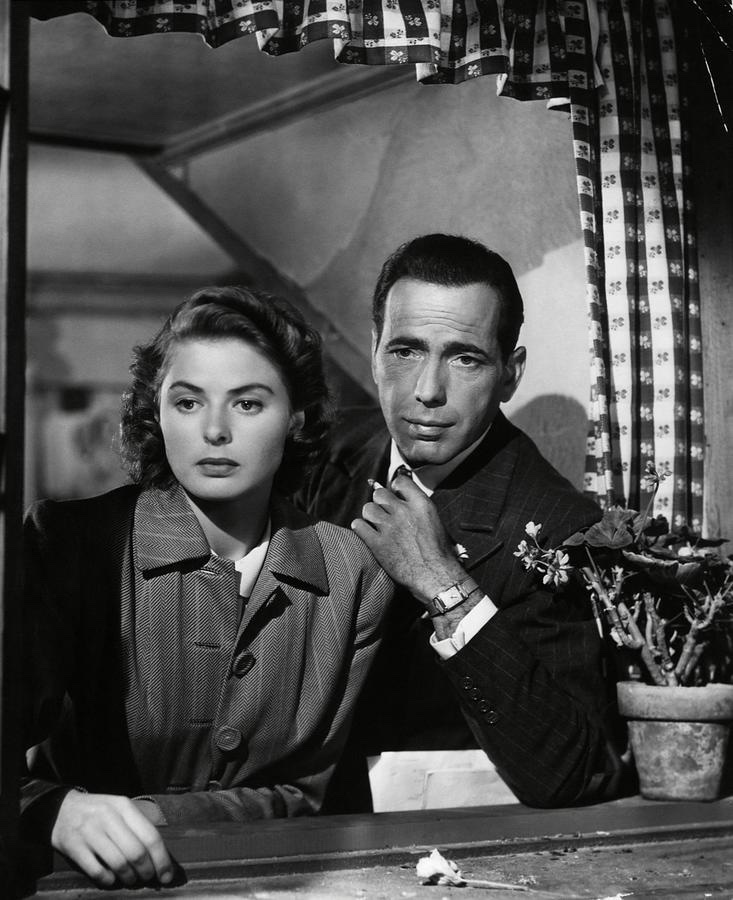Casablanca (Michael Curtiz, 1942) is one of the most influential and popular films ever made. It was directed by Michael Curtiz and produced by Warner Bros. Studios. It epitomises the glamour and style of filmmaking in the golden age of Hollywood, starring a powerful cast, extensive sets, romantic dialogue and an engaging story. Many of its lines have become cemented in film history. “Here’s looking at you, kid.”, “We’ll always have Paris.”, and “This could be the beginning of a beautiful friendship.” Are all iconic lines from the film.
Synopsis:
Context for the story:
The story takes place in Casablanca, a city by in Morocco where European refugees seeking escape from the Nazis wait for transit to Lisbon, and from there, America. Corrupt police govern the city and attempt to impress the Nazi officers visiting by preventing important officials being pursued by the Nazis from gaining passage to America.
The story:
The protagonist is Rick Blaine (Humphrey Bogart) who runs a cafe in the city after fleeing from Paris to escape Nazi persecution, which sports a diverse cast of characters from all corners of the world, most waiting a seemingly endless wait for passage to America. He is a pessimistic, selfish character who mostly keeps to himself. He claims to care for no one other than himself, but this is contested by some of his co-workers, who point out his past assisting revolutionary groups, and his tendency to turn a blind eye to the illegal activity in his cafe helping refugees flee to Lisbon. Later in the film, he even helps a man fleeing Nazi pursuit cheat at roulette so that he can gain enough money to gain a flight to Lisbon, which, much to his dismay, gains the admiration and respect of his employees.
His world is thrown into chaos when a highly elusive and important revolutionary leader Victor Lazlo (Paul Henried) arrives in Casablanca evading Nazi capture, with him his wife and Rick’s ex lover from Paris Ilsa Lund (Ingrid Bergman) who seek letters of transit which Rick has possession of. A flashback reveals that Rick and Ilsa were passionately in love in Paris, and planned to run away together as Rick was to be arrested by the Nazis. Ilsa agrees to this plan, but on the day it was to happen, she left a note for Rick to explain that she could not come. Rick then fled to Casablanca, where he opened a cafe and became a selfish, pessimistic and isolated man. Ilsa begs Rick for the letters, who refuses to aid them for abandoning him in Paris.
Ilsa reveals that she in fact believed Lazlo to be dead in a concentration camp and was lonely in Paris, and while she loves Lazlo she also dearly loves Rick, which changes his mind, and so he hands over the letters. Rick’s claim that he cares for no one other than himself and his facade of a bleak lack of morality are put into question when Ilsa begs him for the letters, and he eventually consents, pulling off a daring plan to get her and Lazlo to America. His corrupt friend and chief of police captain Louis (Claude Rains) at first is forced at gunpoint by Rick to help him, but betrays his friend by informing a Nazi official of the plot. However, when the official arrives, Rick shoots him, and Louis covers for him by telling his men to search elsewhere. This redemption of character is also seen in how Louis throws a bottle from Vichy France into a bin, symbolising his detachment from being a corrupt, nazi puppet official. By giving the letters of transit to Lazlo and Ilsa, Rick makes a noble sacrifice to help the couple escape, leaving himself in danger of arrest in Casablanca. He and Louis escape Casablanca and Nazi pursuit together, walking off into the horizon, a happy, if bittersweet ending, as Rick will likely never see Isla again. However, he has redeemed himself, as now he has openly and actively done a good deed for someone in need of help, without being embarrassed of it.
Techniques:
The film has a linear narrative, only once using a flashback to explain how significant and important Ilsa’s love was to Rick, back when they both lived in Paris. The film uses a composed, non-diegetic score, the most notable track being As Time Goes By, sang by a character in the film, which is used to create romantic moments between Rick and Ilsa, who share fond memories over the song, adding emotion to those scenes, and the the track itself is romantic, making these moments more romantic. The editing is mostly made up of hard-cuts with occasional fade-cuts. The film is also in black and white, so the lighting and composition are focused on heavily. Characters are often framed alone in close-ups, and encompassing wide-shots are used to display environments, such as Rick’s cafe, to the audience, and characters of significance are placed in the centre and forefront of frame to bring our attention to them.
Personally, I enjoyed the scenes in the cafe most. The lighting gave a clean, cosy atmosphere to the building, and the bustling, multicultural atmosphere made the area feel alive and bursting with character, in contrast with Rick’s personality. I also enjoyed the flashback sequences showing the relationship between Rick and Ilsa in Paris, which felt genuine and real, making the audience more attached to them and their relationship.
Overall, I rate Casablanca ★★★★★!

God synopsis, but you really haven’t covered the geo-historical-politics stuff in sufficient detail. Look at what you have written and ask yourself “why?”…
LikeLike